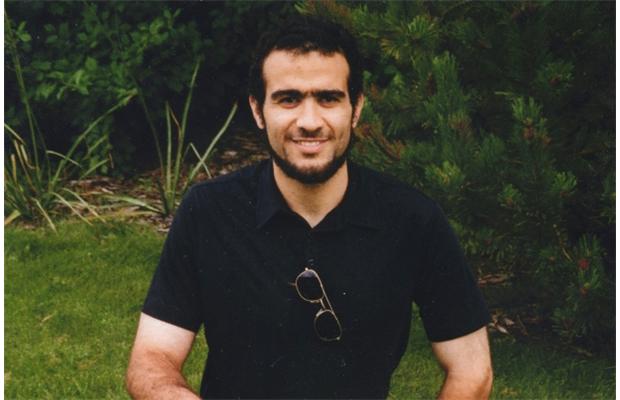
EDMONTON — Omar Khadr arrived at his new home Thursday after almost 13 years behind bars — four of them as a convicted war criminal — and asked Canadians to give him a chance to show he’s worthy of their trust.
“I will prove to them that I’m more than what they thought of me, I’ll prove to them that I’m a good person,” the former Guantanamo Bay prisoner said outside his lawyer’s home just hours after he was released on bail.
“Give me a chance, see who I am as a person not as a name, and then they can make their own judgment after that.”
As for Prime Minister Stephen Harper, whose government has consistently branded him an unrepentant terrorist, Khadr said: “I’m going to have to disappoint him, I’m better than the person he thinks I am.”
He also reassured Canadians that he doesn’t believe in violent jihad.
“It’s not something I believe in right now. I want to start fresh. There are too many good things in life that I want to experience.”
Khadr’s presence seemed well-received by his new neighbours, one of whom shouted “Welcome to the neighbourhood!” Another dropped off flowers.
The 28-year-old had his first taste of freedom earlier in the day after an Alberta judge rejected a last-ditch attempt by the federal government to block his release.
Supporters in the courtroom gasped in joy and Khadr smiled broadly as Appeal Court Justice Myra Bielby delivered her decision.
The government, she said, had failed to prove his release would cause serious harm to Canadian interests or pose a risk to the public.
“Mr. Khadr, you’re free to go,” Bielby said.
Khadr’s longtime lawyer Dennis Edney walked over to his client and whispered, “We done it,” as he squeezed his fingers. Edney’s wife, Patricia, sobbed uncontrollably for a few minutes, then hugged and kissed her husband.
Outside court, an emotional Edney said the day had been a long time coming as he talked about his client’s ordeal since the Americans captured him grievously wounded in Afghanistan in July 2002, when he was 15 years old.
The government, which had said it would fight his release every step of the way, expressed disappointment at the latest turn of events.
“(We) regret that a convicted terrorist has been allowed back into Canadian society without having served his full sentence,” Jeremy Laurin, a spokesman for Public Safety Minister Steven Blaney, said in a statement.
As paperwork was prepared earlier Thursday for Khadr’s release, which comes with a list of restrictions including wearing a tracking bracelet and a curfew, an emotional Edney stepped outside to denounce the federal government for showing no mercy.
“Mr. Harper is a ‘bigot,'” Edney said.
“We left a Canadian child in Guantanamo Bay to suffer torture (and) we Canada participated in this torture. So today’s a wonderful day for justice.”
Within two hours of Bielby’s decision, Khadr left the courthouse for his first venture outside without guards in more than a decade — a grinning Edney by his side.
Khadr pleaded guilty in October 2010 before a widely discredited military commission to five war crimes — including murder in the death of a U.S. special forces soldier. In exchange, the commission handed him a further eight-year sentence.
Dubbed “Guantanamo’s Child,” he was the youngest inmate and lone westerner left in the naval prison at the time. He remains the only person convicted of murder for the battlefield death of an American soldier in Afghanistan.
He returned to Canada from Guantanamo Bay, where he had been held for a decade, in 2012 under an international transfer treaty, and later said he had only pleaded guilty to get out of the notorious prison.
Last month, Alberta Court of Queen’s Bench Justice June Ross granted his bid for bail while he appeals his war-crimes conviction but the Canadian government made a last-ditch attempt to have the ruling stayed.
Bielby, after thinking about it for two days, would have none of it. Any risks to Canadian interests were largely speculative and at best minor, she said.
The U.S. State Department did not comment on Khadr’s release.
Following his transfer to Canada, Khadr was housed in a maximum security institution in Ontario, before being transferred to Edmonton, and then to Bowden Institution near Innisfail, Alta., where he was recently classified as a minimum security prisoner.
Khadr’s legal odyssey is far from over.
His $20-million civil lawsuit that claims the government conspired with the Americans to torture him and breach his rights is still ongoing, while Ottawa’s challenge of his youth status reaches the Supreme Court of Canada next week.
Court documents show Khadr recently told a psychologist that he wanted no part of “this terrorism nonsense” and said he still clings to the hope that he wasn’t the one that threw the hand grenade that killed Sgt. Christopher Speer in Afghanistan.
“I’m sorry for the pain I’ve caused for the families of the victims,” Khadr said Thursday. “There’s nothing I can do about the past but I can do something about the future.”
Among his other restrictions, Khadr will have to face limits on contact with his Toronto family, including only talking to them in English via video or telephone or after prior approval — and under supervision.
“We’re not talking to anybody,” his mother Maha Elsamnah said from her mother’s home in Scarborough, Ontario before hanging up.
Khadr’s late father was a friend of terrorist mastermind Osama bin Laden and his mother has previously angered Canadians by expressing support for al-Qaida.